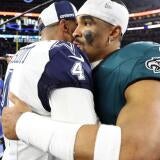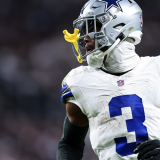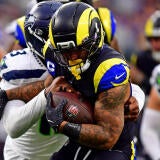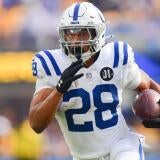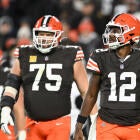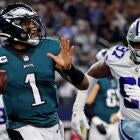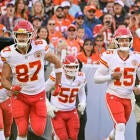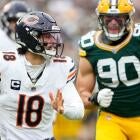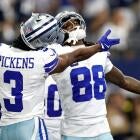How Bears collapsed vs. Vikings on 'Monday Night Football' with penalties, offensive stallouts
It's a new coach but the same old story for the Bears

The Bears started the Ben Johnson era as well as one could have hoped, with a touchdown on their very first possession and, eventually, a lead that got to as large as 17-6 after Nahshon Wright's pick six. Sure, the offense had been uneven after the fast start, but the defense was dominating a struggling J.J. McCarthy, and 17 points looked less like a simple two-possession deficit and more like a mountain.
Well, the Vikings climbed that mountain. McCarthy found his composure and found his playmakers, tossing touchdown passes to Justin Jefferson and Aaron Jones. And in a crucial juncture, McCarthy even called his own number, pulling a read option for a 14-yard touchdown run that all but sealed things.
McCarthy is certainly the headliner, but on a night that looked like a grand welcoming for Johnson and an improved Caleb Williams from Chicago's perspective, things fell apart for the hosts. It's a dispiriting loss certainly, and perhaps only made more dispiriting by how often this seems to happen to Chicago. In fact, according to CBS Sports research, Johnson is the first coach to blow a 10-point fourth quarter lead in his coaching debut since Matt Nagy did it in 2018 with ... the Bears.
So how did the collapse happen? Here are five key moments -- from coaching errors to mental errors to execution errors -- that Chicago will rue after letting a potential win slip away.
1. Ben Johnson's ill-informed challenge
Early in the third quarter, Johnson challenged that T.J. Hockenson fumbled after a short catch, even though replays clearly showed he was down. Johnson's challenge was quickly deemed unsuccessful, and the Bears lost their first timeout of the second half. It may have seemed like no harm, no foul at that point, but those tiny errors can often prove to be what starts -- or at least contributes to -- a collapse. We'll see why in a bit.
2. Bears waste a golden opportunity on the next possesion
Minnesota ended up punting on the punt that featured Johnson's challenge anyway. Chicago then embarked on arguably its best drive since its opening possession, chewing up chunk yardage on the ground. With first and 10 at the Minnesota 24, Wiliams found D'Andre Swift for a 12-yard gain ... only for it to be called back for what looked like a phantom holding call on Darnell Wright.
This is NOT Holding. pic.twitter.com/y4vYOtalhd
— Coach Dan Casey (@CoachDanCasey) September 9, 2025
On first and 20, Williams misfired for Cole Kmet. On second and 20, he took an awful intentional grounding when he held onto the ball too long, a major issue his rookie season. On third and 30, he found Olamide Zaccheaus for a 12-yard gain, but then Cairo Santos missed a 50-yard field goal wide right.
A drive that could have had a first and 10 from the Minnesota 12 ended with zero points.
3. Vikings find their ground game
McCarthy's turnaround is remarkable. It also doesn't happen without the running game getting going. Immediately after Santos' miss, Jordan Mason ripped off runs of 7 and 18 yards. Four plays later, McCarthy found Jefferson for a touchdown.
JUSTIN JEFFERSON GETS HIS FIRST TD OF THE SEASON 🥶
— ESPN (@espn) September 9, 2025
Watch Vikings-Bears on ABC, ESPN and the ESPN App pic.twitter.com/42N4hlgpwb
Chicago even stopped the two-point conversion to maintain a 17-12 lead, but the tension level had certainly risen.
4. Another tough penalty, this time on the defense
Soldier Field is notorious for a -- let's put it nicely -- less than ideal playing surface. Minnesota wide receivers were slipping and sliding all night. This seemingly innocuous fall from Jalen Nailor ended up being yet another tough call -- pass interference on Tyrique Stevenson -- that went against Chicago.
Bears called for pass interference because Nailor slipped pic.twitter.com/mUiL1yd6T2
— Rate the Refs (@Rate_the_Refs) September 9, 2025
Instead of a potential fourth and 1 at the Chicago 41-yard line, the Vikings had first and 10 at the Chicago 27. Jones got behind Noah Sewell, and McCarthy found him for the go-ahead touchdown.
J.J. McCarthy to Aaron Jones to put the Vikings ahead!
— NFL (@NFL) September 9, 2025
MINvsCHI on ESPN/ABC
Stream on @NFLPlus and ESPN+ pic.twitter.com/yCrUxLdH1U
5. A key Williams miss leads to late-game special teams and clock management issues
Yet another Vikings touchdown -- their third straight -- made it 27-17, Minnesota.
With 2:53 left, the Bears went down the field quickly, and Williams found Rome Odunze for a 1-yard touchdown with 2:02 left. The only issue? They could have saved 20 seconds or so if Williams had hit D.J. Moore for an open touchdown earlier.
this throw 😬 pic.twitter.com/zosqqiqiWf
— Warren Sharp (@SharpFootball) September 9, 2025
Still, scoring before the two-minute warning was huge, because the Bears only had one timeout left. (Remember the failed challenge from earlier?) If Chicago could force a three and out and use the two-minute warning and its timeout to stop the clock, the offense could have gotten the ball back with roughly a minute left, down three.
Instead, Santos' kickoff landed in the end zone, and the Vikings were perfectly prepared. Ty Chandler returned the ball, which took seven seconds and therefore triggered the two-minute warning, rather than it happening after the offense's first play.
This kickoff simply has to go out of bounds. Through the end zone is great, but if Santos can't get it there, it has to go out of bounds, even if it's a penalty. At that point, you cannot lose the two-minute warning by allowing a return.
The Bears did get a three and out, but only able to stop the clock once more, the offense got the ball back with nine seconds left and had no chance.
BONUS: Collapse in all three phases
We can nitpick controversial calls. We can point out all the missed opportunities. We can mention every blunder.
Even with them, it is remarkable to see how the Bears collapsed in all three phases. Here are Williams' splits by half:
| Caleb Williams vs. Vikings | 1st Half | 2nd Half |
| Completion percentage | 81% | 42% |
| Yards per attempt | 7 | 5.2 |
| Off-target rate | 13% | 37% |
| Sacks taken | 0 | 2 |
| Expected points added per dropback | 0.23 | -0.18 |
The off-target rate was a big one. Williams missed too many open guys, both downfield and on the basic throws that just keep an offense on target.
The defense crumbled, too. After allowing 35 rushing yards in the first half, it allowed 85 in the second half. Credit Minnesota for sticking with the run even when it was down, but if Chicago had continued to limit it, things would have been much more difficult for McCarthy. Instead, coach Kevin O'Connell was able to get into his playbook with play action and even quarterback runs as the running game opened things up.
The special teams miscues can't go unnoticed, either. The Santos missed field goal was bad, but it was even worse considering Will Reichard made a 59-yarder right before halftime. Santos kicking off a returnable ball late in the fourth quarter was inexcusable. And in a game in which offensive success was hard to come by, Myles Price had punt returns of 20, 17 and 22 yards in the second half alone, a major boost for Minnesota.


